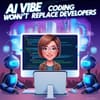The rise of AI vibe coding, which involves using conversational language to generate code with AI assistance, is transforming the software development landscape. However, experts believe it's unlikely to replace human developers. While AI can generate code, it struggles with true problem-solving, creative thinking, and understanding human needs. Human developers bring a nuanced perspective, adapting to changing business needs and user behaviors.
One of the primary limitations of AI vibe coding is its inability to replicate the creative intuition and problem-solving skills of human developers. AI-generated code often requires significant debugging and maintenance efforts, and without proper understanding, developers may struggle to identify and fix errors. Moreover, AI-generated code can introduce security vulnerabilities, such as SQL injection attacks or poorly implemented access controls.
Human developers excel in critical thinking, problem-solving, and creativity, making them indispensable in software development. They understand the underlying business logic, ensuring code is written with purpose and intent. Additionally, human developers collaborate effectively with designers, managers, and clients, facilitating successful project outcomes.
The future of software development lies in collaboration between humans and AI, where machines handle repetitive tasks and humans focus on innovation and creativity. As AI continues to evolve, developers must adapt and acquire new skills to work effectively with AI tools. Teams must use AI responsibly, ensuring code quality, security, and maintainability.
Ultimately, while AI vibe coding can augment the development process, it's unlikely to replace the creative problem-solving skills and nuanced understanding of human developers. By leveraging the strengths of both humans and AI, we can create more efficient, effective, and innovative software development processes.


